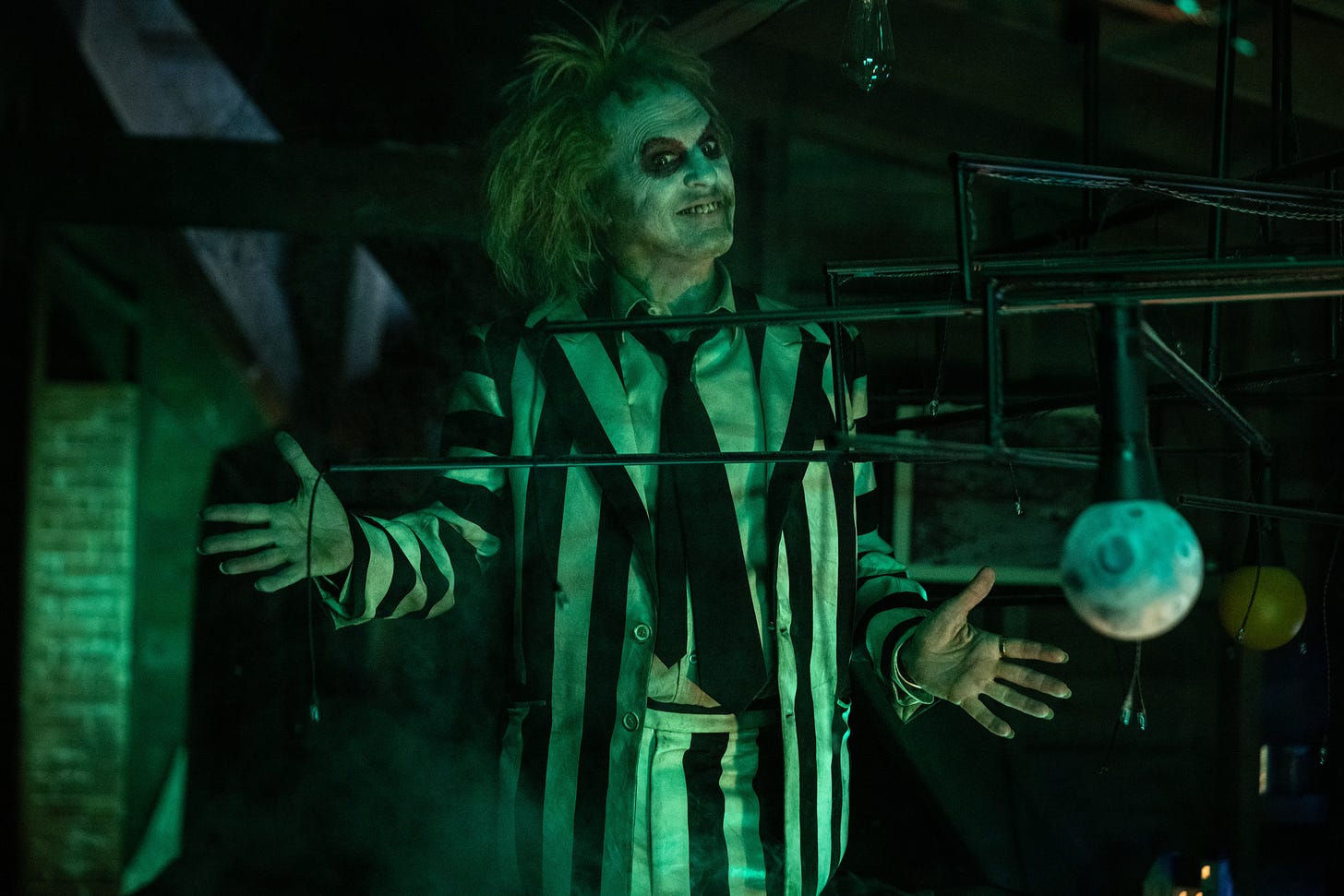Beetlejuice Beetlejuice
Tim Burton returns to his '80s underworld romp with light stakes and a lighter touch.
Horror movies are here to shoulder the burdens of the big questions we don’t want to face head-on. How do we cope with grief? What are we supposed to do with ourselves once we realize our own mortality? Beetlejuice Beetlejuice is here to answer the really big question: what if there was a sequel to the 1988 hit movie Beetlejuice?
That sounds flippant, but Tim Burton’s sequel is itself aggressively cheeky, much to its own benefit. Rather than bogging itself down with the weight of heavy questions, Beetlejuice Beetlejuice lightly skips its way through an underworld romp. There are no deep explorations of lore here. (If anything, a brief detour into Beetlejuice’s backstory with his witchy ex-wife, played by Monica Bellucci, is almost too light on detail.) When one character asks Lydia Deetz (Winona Ryder) whether Beetlejuice is simply a manifestation of her own grief and trauma, Lydia retorts that he isn’t a trauma response—he’s “just a literal demon.” In other movies, horror serves as a heavy metaphor. In Beetlejuice Beetlejuice, there’s no metaphor at all. It’s only Michael Keaton in dead-man makeup, going ham.
Keaton’s performance is just as crass and comedic in this sequel as it is in the first film. The rest of the cast is clearly having fun, too, especially Catherine O’Hara (reprising her role from the original) and Justin Theroux (as Rory, a TV producer). Theroux’s performance feels informed by Ryan Gosling’s turn in Barbie: a man who thinks of himself as smooth but who continually undercuts himself with his own cluelessness. O’Hara, for her part, grounds her own performance of a flighty artist with her signature line deliveries. The only serious character arcs have to do with Lydia and her teenage daughter, Astrid (Jenna Ortega), and even those are handled with a light touch. Lydia is the host of a well-liked TV show about ghosts and hauntings, while Astrid doesn’t believe in anything to do with the afterlife. Naturally, this leads to tension between mother and daughter: where Lydia had been a goth misfit in the original movie, her daughter in the sequel longs to be part of a more normal family.
Needless to say, Tim Burton doesn’t do normal. Beetlejuice Beetlejuice may have the setup of a traditional legacy sequel, and its cast may be drawn with the broadest of sitcom brushstrokes, but the entire endeavor is just an excuse to play comedic games in a colorfully realized world, scrapbooked together through stop-motion sequences, animatronics, and candy-colored costuming. The look and feel of the movie leans heavily on the original Beetlejuice. Classic Tim Burton production design has a distinct feeling all its own; thirty-six years after the original, the sets and costumes feel even more like vintage Halloween decorations, with whimsy and the macabre layered lovingly atop each other.
The stakes are slight, even negligible: the cardboard-and-plastic trappings of Halloween. Beetlejuice himself remains an agent of chaos, if not a particularly dangerous one; Lydia and Astrid coming to understand each other is a foregone conclusion, too. The relationships never feel treacly, and the chaotically grotesque underworld isn’t too scary, either. Not everything needs to be vegetables; we can have some Halloween candy, too. —Sarah Welch-Larson
★★★☆
Beetlejuice Beetlejuice is in theaters now.






Man this just did not work for me. Keaton felt tired (he's running about 50% as fast as he was in the original), and the plot was so overstuffed. Everything was undercooked. I don't need everything to have a backstory, but it would have been nice if half of the stuff in the movie actually mattered to the main plot.
There was a good movie in here, but it was wrapped up in so much fluff.
That said, I had a good time, so there's that I guess? :P